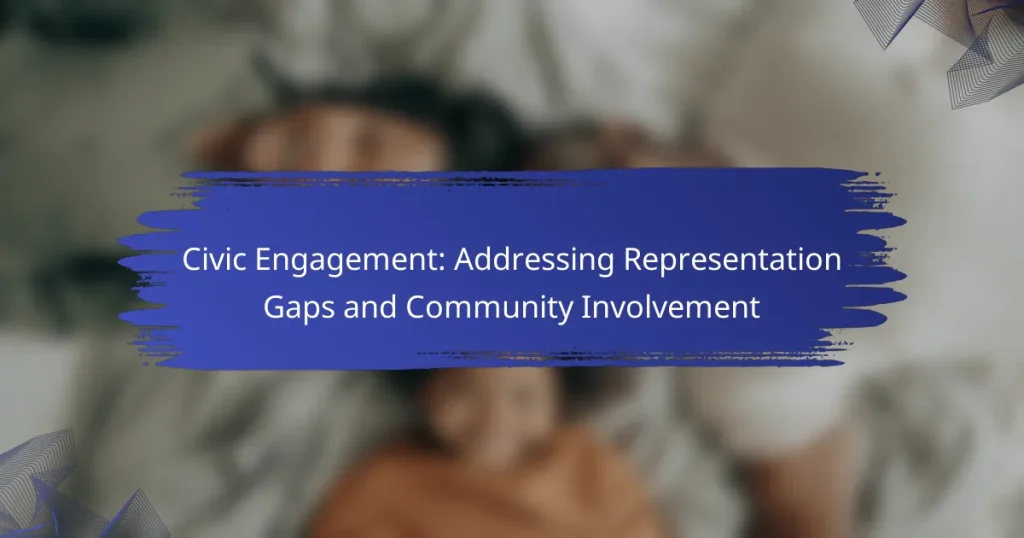
Civic Engagement: Addressing Representation Gaps and Community Involvement
Civic engagement is essential for fostering inclusive communities, particularly in diverse urban areas like Los…
Civic engagement is essential for building vibrant communities and empowering citizens to actively participate in governance. By fostering connections among residents and promoting involvement in local decision-making, civic engagement leads to improved services and a more informed populace. Strategies such as community workshops and partnerships with local organizations can enhance participation and create a strong sense of belonging.
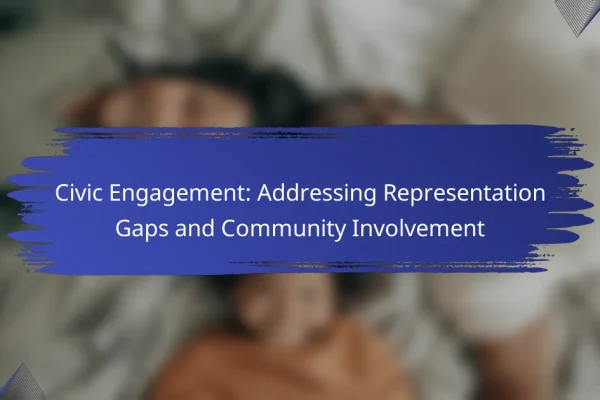
Civic engagement is essential for fostering inclusive communities, particularly in diverse urban areas like Los Angeles. By addressing representation gaps and encouraging active participation through various platforms, residents can influence the decision-making processes that impact their lives. Overcoming barriers to participation is crucial for ensuring that all voices are heard and represented in civic matters….
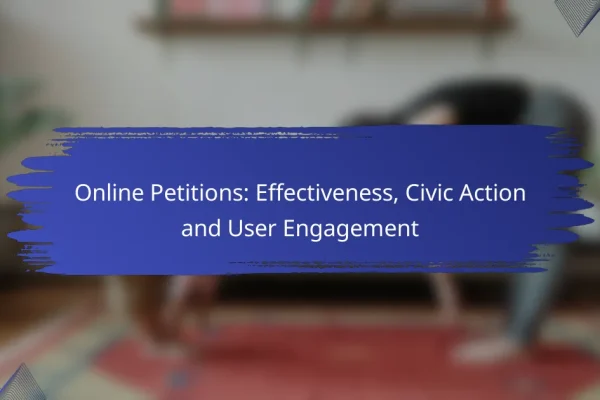
Online petitions serve as a powerful tool for civic engagement, allowing individuals to raise awareness and rally support for various causes. While they may not always result in immediate policy changes, their ability to demonstrate public interest can significantly influence decision-makers. By selecting the right platform, petition creators can enhance visibility and user engagement, fostering…
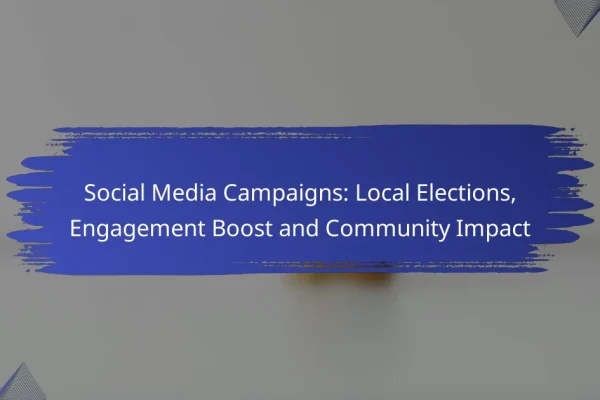
Social media campaigns play a crucial role in enhancing engagement during local elections by bridging the gap between candidates and voters. By utilizing platforms such as Facebook, Twitter, and Instagram, candidates can effectively raise awareness and encourage community participation, ultimately motivating citizens to take part in the electoral process. How can social media campaigns enhance…
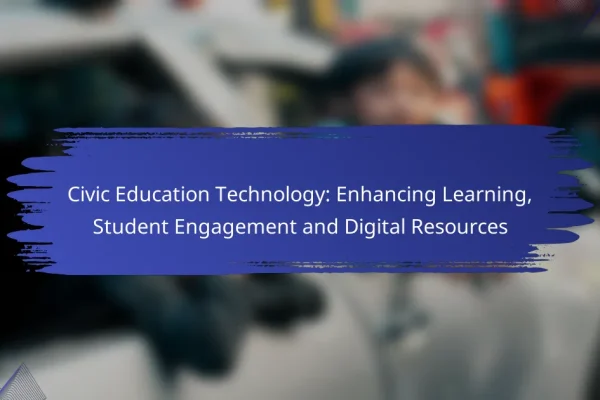
Civic education technology plays a crucial role in enhancing student engagement by offering interactive and personalized learning experiences. By utilizing digital resources, students can explore civic responsibilities and government functions in a relatable manner, fostering a deeper understanding of democracy and encouraging active participation. How can Civic Education Technology enhance student engagement? Civic education technology…
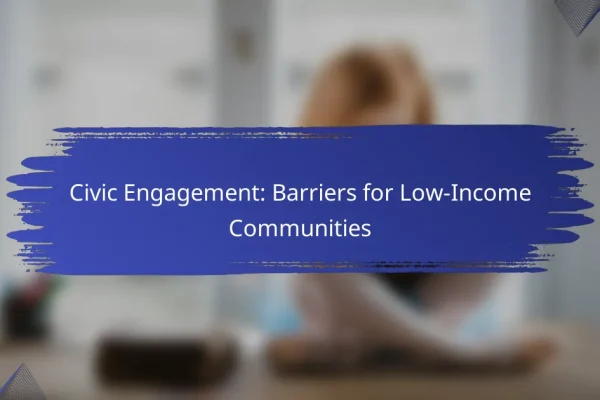
Low-income communities often encounter significant barriers to civic engagement, such as limited access to information, inadequate transportation, and financial constraints. These challenges can impede participation in essential civic activities like voting and community meetings. Addressing these obstacles through targeted strategies and supportive policies is vital for fostering greater involvement and inclusivity in local governance. What…
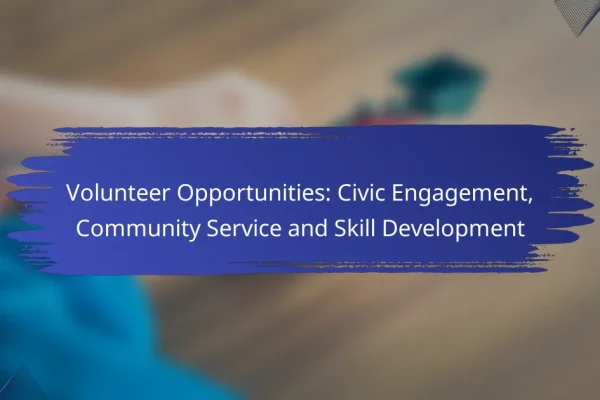
Los Angeles presents a wealth of volunteer opportunities that not only cater to diverse interests but also promote civic engagement and community service. By participating in these initiatives, individuals can develop essential skills while making a meaningful impact on their local communities. What are the best volunteer opportunities in Los Angeles? Los Angeles offers a…
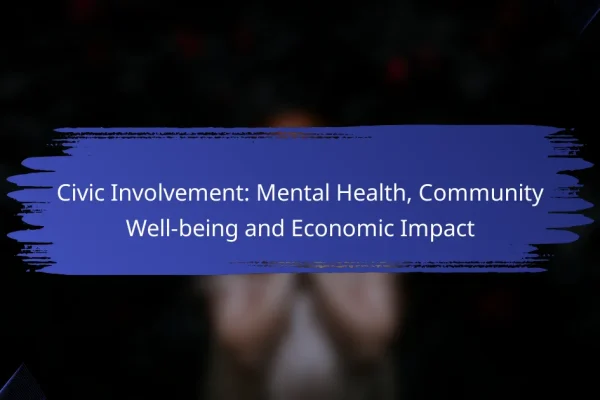
Civic involvement plays a vital role in enhancing mental health and community well-being by fostering connections and providing essential resources. By actively participating in local activities, individuals not only improve their emotional well-being but also contribute to economic growth through job creation and increased business revenues. Encouraging inclusive environments for civic engagement can lead to…
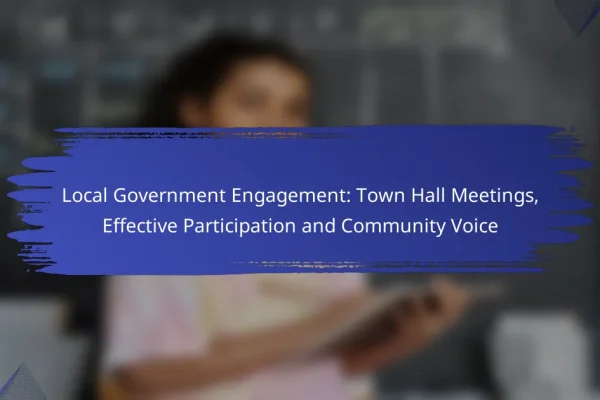
Town hall meetings serve as a vital platform for residents to engage with local government, allowing them to voice concerns and influence decisions that impact their communities. By participating in these meetings, whether in person or online, individuals can foster relationships with local officials and enhance their understanding of civic issues. Implementing effective strategies, such…
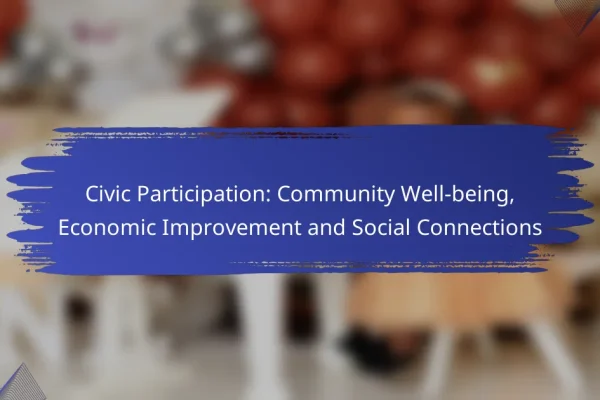
Civic participation plays a crucial role in enhancing community well-being by fostering a sense of belonging and empowering individuals to engage in local decision-making. By actively participating in civic activities, residents can improve their quality of life, strengthen social connections, and contribute to economic growth and sustainability within their communities. How does civic participation enhance…
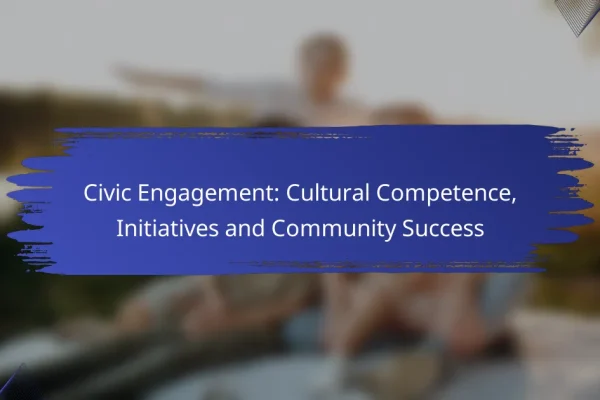
Civic engagement is crucial for fostering strong, vibrant communities, and cultural competence plays a key role in this process. By embracing diverse cultural perspectives, initiatives can enhance participation and collaboration among residents, leading to more effective decision-making and community success. Local governments are increasingly implementing programs that prioritize inclusivity and transparency, empowering individuals to take…
Civic engagement significantly impacts communities in the United States by fostering stronger connections among residents and encouraging active participation in governance. This involvement can lead to improved local services, enhanced quality of life, and a more informed citizenry.
Civic engagement strengthens community cohesion by bringing people together around common goals and interests. When residents participate in local events, volunteer initiatives, or neighborhood meetings, they build relationships that foster trust and collaboration.
For example, community clean-up days or local festivals can unite diverse groups, creating a sense of belonging. This shared experience often leads to ongoing partnerships that address local issues effectively.
Active civic engagement leads to higher levels of political participation among community members. When individuals are informed and involved, they are more likely to vote, attend town hall meetings, and advocate for policies that reflect their needs.
Efforts such as voter registration drives and educational workshops can empower residents, particularly in underrepresented communities, to engage in the electoral process. This increased participation can influence local and state policies significantly.
Civic engagement plays a crucial role in promoting social justice initiatives by mobilizing communities to address inequities. Grassroots movements often arise from engaged citizens who recognize the need for change and work collectively to advocate for marginalized groups.
For instance, organizing campaigns for affordable housing or equitable education can lead to policy reforms that benefit entire communities. Engaging in these initiatives not only raises awareness but also creates actionable pathways for social change.
Effective strategies for increasing civic engagement in local areas include organizing community workshops, leveraging social media, and forming partnerships with local organizations. These approaches foster participation and create a sense of belonging among residents.
Community workshops and forums serve as platforms for residents to discuss local issues and share ideas. These gatherings can be structured around specific topics, such as public safety or education, and typically encourage open dialogue.
To maximize participation, consider hosting workshops at accessible locations, such as community centers or libraries, during evenings or weekends. Providing refreshments can also enhance attendance and create a welcoming atmosphere.
Social media campaigns effectively reach a broad audience and engage younger demographics. Platforms like Facebook, Twitter, and Instagram can be used to share information about civic events, initiatives, and opportunities for involvement.
When creating social media content, use eye-catching visuals and clear calls to action. Regularly update followers with relevant news and encourage them to share posts to expand the campaign's reach.
Forming partnerships with local organizations can amplify civic engagement efforts. Collaborating with schools, non-profits, and businesses allows for resource sharing and can attract diverse community members.
Identify organizations that align with your civic goals and propose joint events or initiatives. This approach not only strengthens community ties but also enhances the credibility of civic engagement efforts.
Schools play a crucial role in fostering civic engagement by providing students with the knowledge and skills necessary to participate actively in their communities. Through various programs and curricula, schools can instill a sense of responsibility and encourage students to become informed citizens.
A comprehensive civics education curriculum is essential for teaching students about their rights, responsibilities, and the functioning of government. This curriculum often includes topics such as the Constitution, the electoral process, and the importance of civic participation. Schools may incorporate interactive lessons, debates, and discussions to engage students effectively.
Many states have established standards for civics education, which can guide schools in developing their programs. For example, students might be required to complete a certain number of hours in civics classes to graduate, ensuring they have a foundational understanding of civic duties.
Student government programs provide students with hands-on experience in leadership and decision-making within their school community. These programs often involve elections, where students campaign for positions, allowing them to practice democratic principles. Participation in student government can enhance students' understanding of governance and encourage them to take on leadership roles in the future.
Schools can support these programs by providing resources for campaigns and training students on parliamentary procedures. This practical experience helps students develop skills that are transferable to civic engagement outside of school.
Many schools implement community service requirements as part of their curriculum to promote civic responsibility. These requirements often involve students completing a set number of service hours, which can include volunteering at local organizations, participating in environmental clean-ups, or assisting in community events. This engagement not only benefits the community but also helps students understand the impact of their contributions.
To ensure effectiveness, schools should provide students with a range of service opportunities that align with their interests and skills. This approach encourages meaningful participation and fosters a lifelong commitment to civic engagement.
Barriers to civic engagement in urban areas include a lack of access to information, socioeconomic disparities, and voter apathy. These factors can significantly hinder individuals' ability to participate in civic activities and influence local governance.
Access to information is crucial for civic engagement, yet many urban residents face challenges in obtaining it. Limited internet access, particularly in low-income neighborhoods, can restrict individuals from learning about local issues, upcoming elections, and civic opportunities.
Moreover, information may not always be presented in an accessible format. Complex language or technical jargon in official communications can alienate those who are not familiar with civic processes, further diminishing participation.
Socioeconomic status plays a significant role in civic engagement. Individuals from lower-income backgrounds often have less time and resources to dedicate to civic activities due to work obligations or financial constraints. This can lead to a cycle where their voices are underrepresented in decision-making processes.
Additionally, disparities in education can affect civic knowledge. Those with limited educational opportunities may not feel empowered to engage in civic matters, leading to lower participation rates in elections and community initiatives.
Voter apathy is a growing concern in urban settings, where many individuals feel that their votes do not matter. This disillusionment can stem from experiences of corruption, ineffective governance, or a lack of relatable candidates, making citizens less likely to participate in elections.
To combat this, community organizations can play a vital role by fostering a sense of trust and demonstrating the tangible impact of civic engagement. Initiatives that highlight local successes can motivate individuals to become more involved and see the value in their participation.
Technology can significantly enhance civic engagement by providing accessible platforms for participation and communication. By leveraging digital tools, communities can facilitate greater involvement in decision-making processes and foster transparency in governance.
Online voting platforms allow citizens to cast their votes securely from anywhere, increasing participation rates. These systems often use encryption and secure identification methods to protect voter information and ensure the integrity of the election process.
For example, jurisdictions that have implemented online voting have seen participation rates rise by several percentage points compared to traditional methods. However, it's crucial to ensure that these platforms comply with local regulations and are accessible to all voters, including those with disabilities.
Mobile apps designed for community feedback enable residents to voice their opinions on local issues easily. These applications can include features such as surveys, polls, and forums, allowing for real-time input from citizens.
For instance, cities can use these apps to gather feedback on proposed projects or policies, ensuring that community voices are heard. When implementing such tools, it's essential to promote them widely to maximize participation and to address any concerns about data privacy.
Virtual town hall meetings provide a platform for local leaders to engage with constituents without geographical constraints. These meetings can be conducted via video conferencing tools, allowing for interactive discussions and Q&A sessions.
To ensure effectiveness, organizers should promote these events in advance and provide clear instructions on how to participate. Additionally, recording sessions can help reach those who are unable to attend live, further enhancing community engagement.